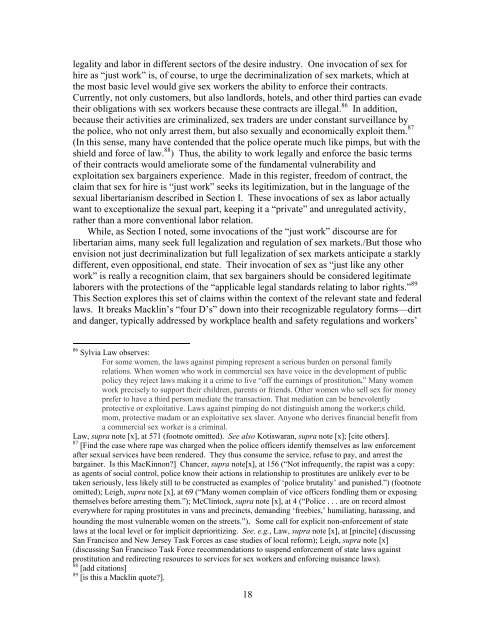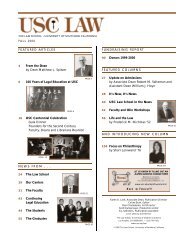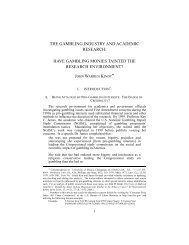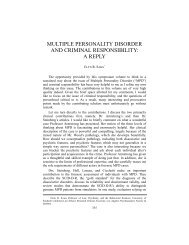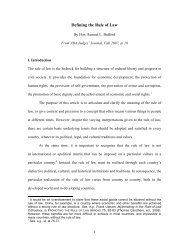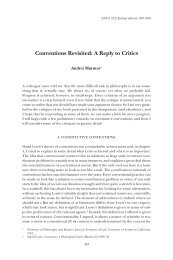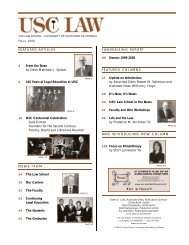1 Regulating Sex Work Adrienne D. Davis VERY ROUGH DRAFT ...
1 Regulating Sex Work Adrienne D. Davis VERY ROUGH DRAFT ...
1 Regulating Sex Work Adrienne D. Davis VERY ROUGH DRAFT ...
You also want an ePaper? Increase the reach of your titles
YUMPU automatically turns print PDFs into web optimized ePapers that Google loves.
legality and labor in different sectors of the desire industry. One invocation of sex for<br />
hire as “just work” is, of course, to urge the decriminalization of sex markets, which at<br />
the most basic level would give sex workers the ability to enforce their contracts.<br />
Currently, not only customers, but also landlords, hotels, and other third parties can evade<br />
their obligations with sex workers because these contracts are illegal. 86 In addition,<br />
because their activities are criminalized, sex traders are under constant surveillance by<br />
the police, who not only arrest them, but also sexually and economically exploit them. 87<br />
(In this sense, many have contended that the police operate much like pimps, but with the<br />
shield and force of law. 88 ) Thus, the ability to work legally and enforce the basic terms<br />
of their contracts would ameliorate some of the fundamental vulnerability and<br />
exploitation sex bargainers experience. Made in this register, freedom of contract, the<br />
claim that sex for hire is “just work” seeks its legitimization, but in the language of the<br />
sexual libertarianism described in Section I. These invocations of sex as labor actually<br />
want to exceptionalize the sexual part, keeping it a “private” and unregulated activity,<br />
rather than a more conventional labor relation.<br />
While, as Section I noted, some invocations of the “just work” discourse are for<br />
libertarian aims, many seek full legalization and regulation of sex markets./But those who<br />
envision not just decriminalization but full legalization of sex markets anticipate a starkly<br />
different, even oppositional, end state. Their invocation of sex as “just like any other<br />
work” is really a recognition claim, that sex bargainers should be considered legitimate<br />
laborers with the protections of the “applicable legal standards relating to labor rights.” 89<br />
This Section explores this set of claims within the context of the relevant state and federal<br />
laws. It breaks Macklin’s “four D’s” down into their recognizable regulatory forms—dirt<br />
and danger, typically addressed by workplace health and safety regulations and workers’<br />
86 Sylvia Law observes:<br />
For some women, the laws against pimping represent a serious burden on personal family<br />
relations. When women who work in commercial sex have voice in the development of public<br />
policy they reject laws making it a crime to live “off the earnings of prostitution.” Many women<br />
work precisely to support their children, parents or friends. Other women who sell sex for money<br />
prefer to have a third person mediate the transaction. That mediation can be benevolently<br />
protective or exploitative. Laws against pimping do not distinguish among the worker;s child,<br />
mom, protective madam or an exploitative sex slaver. Anyone who derives financial benefit from<br />
a commercial sex worker is a criminal.<br />
Law, supra note [x], at 571 (footnote omitted). See also Kotiswaran, supra note [x]; [cite others].<br />
87 [Find the case where rape was charged when the police officers identify themselves as law enforcement<br />
after sexual services have been rendered. They thus consume the service, refuse to pay, and arrest the<br />
bargainer. Is this MacKinnon?] Chancer, supra note[x], at 156 (“Not infrequently, the rapist was a copy:<br />
as agents of social control, police know their actions in relationship to prostitutes are unlikely ever to be<br />
taken seriously, less likely still to be constructed as examples of ‘police brutality’ and punished.”) (footnote<br />
omitted); Leigh, supra note [x], at 69 (“Many women complain of vice officers fondling them or exposing<br />
themselves before arresting them.”); McClintock, supra note [x], at 4 (“Police . . . are on record almost<br />
everywhere for raping prostitutes in vans and precincts, demanding ‘freebies,’ humiliating, harassing, and<br />
hounding the most vulnerable women on the streets.”). Some call for explicit non-enforcement of state<br />
laws at the local level or for implicit deprioritizing. See, e.g., Law, supra note [x], at [pincite] (discussing<br />
San Francisco and New Jersey Task Forces as case studies of local reform); Leigh, supra note [x]<br />
(discussing San Francisco Task Force recommendations to suspend enforcement of state laws against<br />
prostitution and redirecting resources to services for sex workers and enforcing nuisance laws).<br />
88 [add citations]<br />
89 [is this a Macklin quote?].<br />
18


